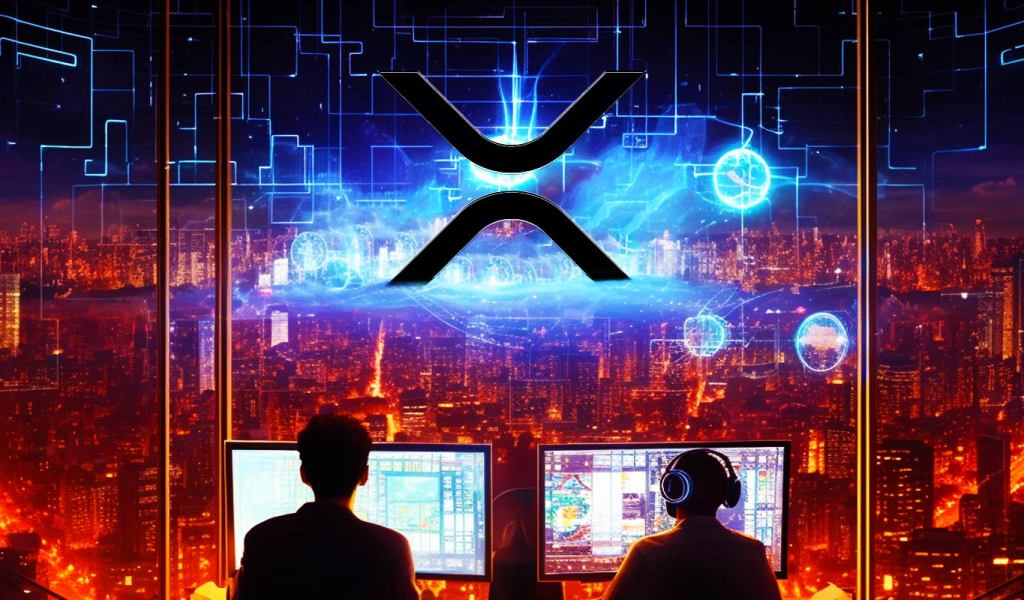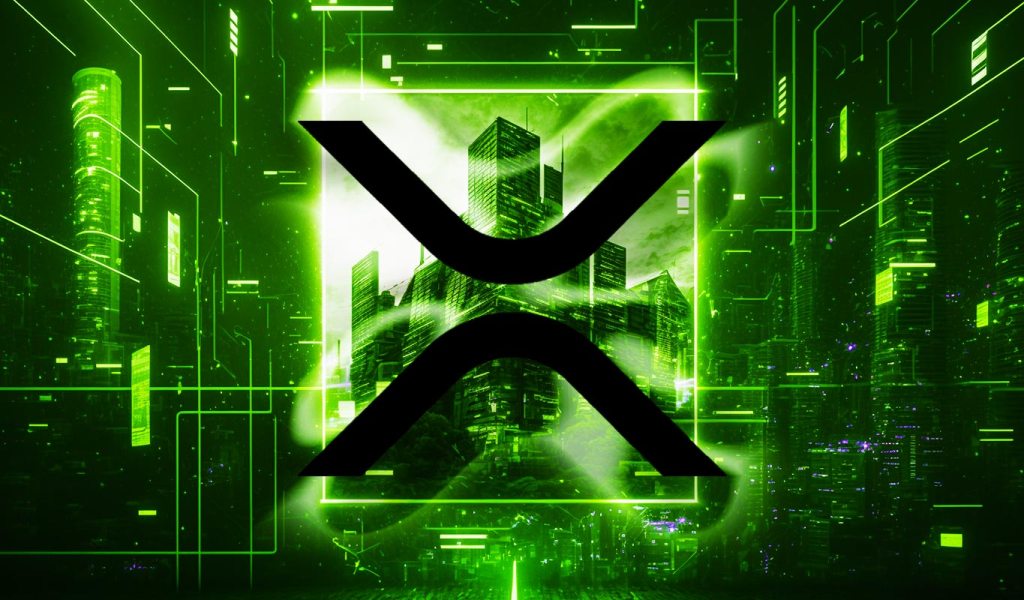
Non-fungible token (NFT) activity is exploding on the XRP Ledger (XRPL), according to a recent update from Ripple. In a new quarterly report, Ripple notes that more than half of all the NFTs ever minted on the XRPL since the release of the XLS-20 standard in 2022 happened in the fourth quarter of 2023. The […]
The post Number of Non-Fungible Token Mints on the XRP Ledger Surged by More Than 400% in 2023 Q4, According to Ripple appeared first on The Daily Hodl.

Payments company Ripple has launched a new partnership to help enable cross-border payments between Africa and a slew of other markets. Ripple says in a new press release that it is partnering with Onafriq, a fintech firm with a network spanning 40 African markets. Onafriq will use Ripple’s crypto-enabled payments technology to launch payment corridors […]
The post Ripple Strikes New Partnership To Enable Cross-Border Payments Between UK, Australia, Gulf Countries and Africa appeared first on The Daily Hodl.

Crypto analytics platform Messari says Ripple is working with governments across the globe to explore central bank digital currencies (CBDCs) built atop the XRP Ledger (XRPL) blockchain. According to Messari, Ripple is collaborating with over a dozen countries on CBDCs that will run on the XRPL blockchain. The XRP Ledger uses XRP as the native […]
The post XRPL at the Forefront of CBDC Explorations by Governments, Says Analytics Firm Messari appeared first on The Daily Hodl.

Payments platform Ripple is unveiling a new protocol that would allow large-scale institutions to issue their own central bank digital currencies (CBDCs). According to a new press release, Ripple Labs is announcing the Ripple CBDC Platform, a project that would allow central banks, financial institutions, and governments to manage and customize their own CBDCs and […]
The post Ripple Unveils CBDC Platform To Enable Governments and Other Institutions To Issue National Digital Currencies appeared first on The Daily Hodl.

An AI chatbot alleged Ripple can secretly control its blockchain through an undisclosed backdoor in the network's code and has been ridiculed by the firm's CTO.
Ripple’s chief technology officer has responded to a conspiracy theory fabricated by Artificial Intelligence (AI) tool ChatGPT, which alleges the XRP Ledger (XRPL) is somehow being secretly controlled by Ripple.
According to a Dec. 3 Twitter thread by user Stefan Huber, when asked a series of questions regarding the decentralization of Ripple’s XRP Ledger, the ChatGPT bot suggested that while people could participate in the governance of the blockchain, Ripple has the “ultimate control” of XRPL.
Asked how this is possible without the consensus of participants and its publicly-available code, the AI alleged that Ripple may have “abilities that are not fully disclosed in the public source code.”
At one point, the AI said “the ultimate decision-making power” for XRPL “still lies with Ripple Labs” and the company could make changes “even if those changes do not have the support of the supermajority of the participants in the network.”
It also contrasted the XRPL with Bitcoin (BTC) saying the latter was “truly decentralized.”
However, Ripple CTO David Schwartz has called the bot’s logic into question, arguing that with that logic, Ripple could secretly control the Bitcoin network as it neither can be determined from the code.
If it's final argument is that Ripple Labs "may have" some secret way to control the XRP Ledger that cannot be determined from the public code, why not argue that Ripple Labs "may have" some secret way to control the bitcoin blockchain that cannot be determined from the code?
— David "JoelKatz" Schwartz (@JoelKatz) December 5, 2022
The bot was also shown to contradict its own statements in the interaction, stating that the main reason for using “a distributed ledger like the [XRPL] is to enable secure and efficient transactions without the need for a central authority,” which contradicts its statement that the XRPL is managed centrally.
Related: Ripple files final submission against SEC as landmark case nears end
ChatGPT is a chatbot tool built by AI research company OpenAI which is designed to interact “in a conversational way” and answer questions about almost anything a user asks. It can even complete some tasks such as creating and testing smart contracts.
The AI was trained on “vast amounts of data from the internet written by humans, including conversations” according to OpenAI and warned because of this some of the bot's reponses can be “inaccurate, untruthful, and otherwise misleading at times.”
OpenAI CEO Sam Altman said upon its release on Nov. 30 that its “an early demo” and is “very much a research release.” The tool has already seen over one million users according to a Dec. 5 tweet by Altman.
Ethereum founder Vitalik Buterin also weighed in on the AI chatbot in a Dec. 4 tweet saying the idea that AI “will be free from human biases has probably died the hardest.”
Of all the optimistic 00s era takes, "AI will think logically from first principles so it will be free from human biases" has probably died the hardest. https://t.co/5rz33AEgKb
— vitalik.eth (@VitalikButerin) December 4, 2022

Non-fungible tokens (NFTs) are now live on the XRP Ledger (XRPL) after a new amendment enabling extensions supporting a native NFT type on the ledger was activated. David Schwartz, Ripple’s chief technology officer, says in a new blog post that RippleX engineers built the new feature using a no-smart-contracts approach to increase its cost-effectiveness and […]
The post Ripple CTO Identifies Key Milestone As XRP Ledger Sees NFTs Go Live on Mainnet appeared first on The Daily Hodl.

A new NFT marketplace is giving a hard pass to optional royalties, bucking the trend, and NFTs are getting a new home on Ripple’s XRPL.
While nonfungible token (NFT) marketplaces such as Ethereum (ETH)-based X2Y2, LooksRare, and Solana (SOL)-based Magic Eden have made the switch over to “optional” creator royalties, a newly launched marketplace is taking a hard stand against it.
Find Satoshi Lab, the company behind the popular move-to-earn app StepN has launched its new NFT marketplace named MOOAR on Nov. 1, notably featuring “no optional royalties.”
Instead, its NFT royalty policy will be set to a default of 2% but allows creators to set royalties between 0.5% to 10%. There is no option for 0% royalties, nor can it be set by the user.
“With the raging debate going on surrounding the paying of royalties, we are aware that many users have been vocal in opposing the enforcement of such royalties,” said the MOOAR team in a Medium post.
“Fully empathizing with the sentiment, we strongly believe this ‘cancel culture’ has forced marketplaces into a corner to the point that prominent marketplaces have adopted optional royalties,” it added.
Launch Day! Get #MOOAR!
— MOOAR | Season #1 (@mooarofficial) November 1, 2022
Find Satoshi Lab (@FSLWeb3), the company behind STEPN, is thrilled to announce the launch of MOOAR NFT marketplace & launchpad.
This milestone is one of many on our roadmap to become a one-stop platform for the Web3 Community. ⬇ [1/10] pic.twitter.com/IfSSo2RWaS
On Aug. 27, Ethereum-based NFT marketplace X2Y2 announced it would be introducing an option that allows buyers to set the royalty fee when buying an NFT.
With the new update, buyers on the platform will be given the liberty of setting the amount of royalties they want to contribute to an NFT project. This means that some creators may not receive royalties when their artworks are sold.
The controversial move was followed by the Solana-based NFT marketplace Magic Eden on Oct. 15, which announced it would also be moving to an optional royalty model after “difficult reflection and discussion with many creators.”
Less than two weeks later on Oct. 27, NFT marketplace LooksRare became the latest to succumb to pressure from buyers, announcing it was doing away with enforcing creator royalties, allowing buyers to choose to pay royalties on an opt-in basis.
Credit card giant Visa has become the latest major company set to cash in on FIFA World Cup-related nonfungible tokens (NFTs) — unveiling a charity auction for five NFTs ahead of the upcoming tournament in Qatar.
The auction is in partnership with crypto exchange Crypto.com, with all auction proceeds going to Street Child United, a charitable organization promoting the rights of impoverished children.
Each NFT features digital art inspired by icon goals from five famed soccer players including Jared Borgetti, Tim Cahill, Carli Lloyd, Michael Owen, and Maxi Rodriguez, and is part of the “Visa Masters of Movement.”

The credit card company has been a long supporter of NFTs and its ability to provide a “promising medium for fan engagement.”
In a report released on Aug. 23, 2021, Visa said that “NFTs appeal to collectors, fans, teams, leagues, and talent.”
In particular, NFTs can become primary sources of fan engagement, customer relationship management, and newer revenue streams, it said.
Visa’s announcement also comes on the same day that Crypto.com announced it will now be able to self-issue its own Crypto.com Visa card in Singapore, after becoming a Visa Associate Program Member in the city-state.
The Crypto.com Visa card will allow the exchange’s users in Singapore to use it for everyday purchases and earn rewards in CRO coins.
Visa is the Official Payment Technology Partner of FIFA. Other notable sponsors include Crypto.com which became an official sponsor in March, and blockchain network Algorand, which inked a partnership in May as FIFA’s official blockchain platform.
As of Oct. 31, Ripple’s XRPL blockchain has officially become a new home for NFTs.
RippleX developers have been working on the project since the XLS-20 proposal was filed on May 25, 2021, which proposed the goal to bring NFTs to the XRP Ledger.
At the time, the team described the proposal as one that would introduce extensions to the XRP Ledger that would support a “native non-fungible token type, along with operations to enumerate, purchase, sell and hold such tokens.”
Ripple CTO David Schwartz told his 395,600 Twitter followers on Oct. 31 that the XLS-20 standard has now been enabled on the XRP Ledger Mainnet after a vote approved the roll-out of the technology.
Schwartz noted that “this presents a key milestone for developers and creators to tokenize any asset and build innovative Web3 projects with utility.”
Thanks to the collective effort of the #XRPL community and @RippleXDev engineers, XLS-20 is now enabled on the XRP Ledger Mainnet and a few NFTs have already been minted. (1/4)
— David "JoelKatz" Schwartz (@JoelKatz) October 31, 2022
In an accompanying Nov. 1 blog post, Schwartz said the benefits of launching NFTs on the XRP Ledger include much lower costs for minting, trading and otherwise transferring NFTs compared to “leading layer-1 blockchain solutions.”
He also said their “no-smart contracts” approach will make NFTs on the XRPL less vulnerable to hacks, while NFTs will include “automatic royalties” which essentially allow creators to be given a share of revenue whenever an NFT is bought or sold.
The indie developer behind farming sim game Coral Island has taken to Twitter to warn its followers of a scammer impersonating them on the internet and purporting to be involved in “GameFi” and NFTs.
The developer Stairway Games pointed to the doppelganger account on Twitter on Oct. 31, clarifying that Coral Island “is not an NFT game” and the page has no affiliation with Coral Island.
Related: Steph Curry files trademark for the Curryverse, where players earn NFTs
The fake Coral Island Twitter page in question describes itself as “Re-imagined farm sim game goes GameFi. Enter the farmverse!” and links to a similar Instagram page, as well as a fully-decked-out website using assets, lifted directly from the developers.
The website includes sections such as “Roadmap” and “Tokenomics,” with claims that it would launch staking, airdrops, character NFTs, and a “token earning system” in the future.
Hey folks, this is not us. @coralislandgame is the only Coral Island game twitter page. We are not an NFT game and the page below has no affiliation to Coral Island. Thank you! pic.twitter.com/Aei1650McT
— Stairway Games (@stairwaygames) October 31, 2022
Coral Island is a farming simulator game currently in early access, it’s said to be a mix of “Harvest Moon, Story of Seasons, Stardew Valley and a tiny bit of Animal Crossing,” according to one user review on gaming platform Steam.
The nonfungible token (NFT) marketplace for American video game retailer GameStop has officially gone live on Ethereum layer-2 blockchain ImmutableX, all part of the latest Web3 push from the gaming retailer.
There’s been pushback from Silicon Valley CEOs about the current iterations of the Metaverse. Microsoft gaming chief Phil Spencer called it a “poorly built video game,” while Snap CEO Evan Spiegel hinted that the current iterations of the concept are very basic, and he won’t feel like spending time inside it after a long day of work.

The team behind the largest euro-backed stablecoin is announcing integration with Ripple Lab’s XRP Ledger (XRPL). In a new blog post, Stasis, the company behind STASIS EURO (EURS), says they have completed integrating EURS into the XRP Ledger. Says Stasis CEO Gregory Klumov, “Another brick has just been added into the foundation of EURS, and it […]
The post Ripple Helps Bring New Euro-Pegged Stablecoin to XRP Ledger appeared first on The Daily Hodl.

The firm emphasized that its rather large XRP ownership is decreasing and that it only “operates 4 out of 130+ validator nodes on the XRPL.”
Ripple Lab’s XRP token holdings have dropped below 50% of the total circulating supply for the first time in the company’s history.
Ripple has faced criticism in the past by some that have raised questions over the firm’s significantly large ownership of XRP tokens, arguing that it gives the company centralized control over its XRP Ledger (XRPL).
In a Q3 report published on Oct. 27, Ripple once again refuted that criticism, while also pointing out that its XRP holdings continue to decline, falling below 50 billion tokens, or 50% of the total supply.
“Critics have pointed to the company’s XRP ownership as an indicator that the XRP Ledger is controlled by Ripple. This is not true,” Ripple stated, adding that:
“The XRP Ledger (XRPL) uses Federated Byzantine Consensus to validate transactions, add new features, and secure the network, which means that each validator node gets one vote regardless of how much XRP they own.”
The firm went on to state that it “currently operates 4 out of 130+ validator nodes on the XRPL.”
Below 50% - a huge milestone! For 10 years, Ripple has focused on using XRP & the XRPL within our products for its speed, security and scalability for movement of value. As more customers use XRP in their payments flows, it’s clear there is real utility here. https://t.co/jKZwye17uZ
— Brad Garlinghouse (@bgarlinghouse) October 27, 2022
Ripple disclosed in the report that its total net sales (sales minus purchases) of XRP for Q3 was down to $310.68 million compared to $408.9 million in Q2.
“Ripple has continued to sell XRP only in connection with ODL transactions, and ODL volumes have ramped up as Ripple’s ODL [On-Demand Liquidity] business expanded globally,” the report reads.
One of Ripple’s key business offerings is its cross-border payments service ODL, and the company outlined that it continued to expand the product in Q3 via a partnership with forex firm Travelex to facilitate transactions between Brazil and Mexico.
Related: Ripple’s lead engineer to exit after nearly a decade with the firm
Ripple also commented on its lengthy legal dispute with the U.S. Securities and Exchange Commission (SEC), after scoring a big win relating to the elusive William Hinman documents earlier this month.
The documents in question relate to a speech from former SEC division director Hinman in which he describes the regulatory status of BTC and ETH in terms that may help Ripple’s case, and contradict the SEC’s arguments.
“Since Hinman’s market moving speech, the SEC continues to deliberately create ambiguity, instead of providing clear guidance, and uses that ambiguity to bring enforcement actions to stifle crypto innovation in the United States.”
“In terms of next steps, in November, the SEC and Ripple will file reply briefs, and, from there, await the Judge’s decision on the motions,” the report adds.
XRP is down 2.4% over the past 24 hours to sit at $0.46 at the time of writing but has gained 3.7% over the past week. Unlike a host of other major assets that hit new all-time highs last year, XRP’s peak was almost five years ago at $3.40 on Jan. 7, 2018.

Nik Bougalis primarily worked on open-source code projects for the payments-focused XRP Ledger, with the recent push to introduce NFTs being a key implementation of note.
Ripple Labs’ director of engineering Nik Bougalis is exiting the firm after nearly 10 years, becoming the latest of crypto's long-time serving executives to depart from the space.
In an Oct. 22 tweet, Bougalis noted that: “my decade-long journey at Ripplehas been a fantastic (if exhausting and all-consuming) one. I got to work on a project that I love, towards a goal I believe in. But that journey will be coming to an end in a few weeks.”
“All good things…”
— (@nbougalis) October 21, 2022
My decade-long journey at @Ripple has been a fantastic (if exhausting and all-consuming) one.
I got to work on a project that I love, towards a goal I believe in.
But that journey will be coming to an end in a few weeks.
Interestingly, the Ripple developer noted that he will not be joining a blockchain project or company next.
“As for what’s next? I’ll talk about it when it’s time, but I am NOT joining another blockchain project/company, nor am I doing NFTs or DeFi,” he said.
Bougalis has a lengthy background in software engineering and cryptography, and while at Ripple, he primarily worked on open-source code projects for the payments XRP Ledger, also known as XRPL.
One of Ripple’s key recent developments that Bougalis has overseen is the XLS-20 amendment which will see the introduction of nonfungible tokens (NFTs) to XRPL. While there were a few initial bugs that reportedly needed ironing out, the upgrade is reportedly set to go through in early November.
The cryptographer went on to state his thoughts that Ripple will do just fine without him.
“Its long-term health and success isn't predicated on any one person. I’m confident that it will be just fine, thanks to talented and passionate individuals who contribute and participate, each in their own way.”
Related: Ripple’s $250M fund backs Web3 projects focused on ‘entertainment and media’
The blockchain sector has seen a number of top figures step away from their companies this month, such as the chief financial officer of NFT marketplace OpenSea, Brian Roberts who revealed on Oct. 7 that he is exiting the firm.
On Oct. 21, Polkadot co-founder Gavin Wood also called an end to his time at blockchain infrastructure company Parity Technologies, stating that it was not a position where he saw himself finding “eternal happiness.”
Other high-profile execs that followed the same route over the past few months include FTX US president Brett Harrison, Kraken CEO Jesse Powell, MicroStrategy CEO Michael Saylor and Genesis Trading CEO Michael Moro.
On a broader front, Ripple recently scored a notable win in its long-running legal battle with the U.S. Securities and Exchange Commission (SEC) over alleged securities violations with XRP.
On Oct. 21, Ripple general counsel Stuart Alderoty revealed on Oct. 21 that the firm finally got their hands on important documents that could significantly strengthen its defence against SEC.
The documents in question relate to a 2018 speech by former SEC division director William Hinman relating to the regulatory status of Ether, which the government agency has fought long and hard to keep under wraps during the legal dispute.